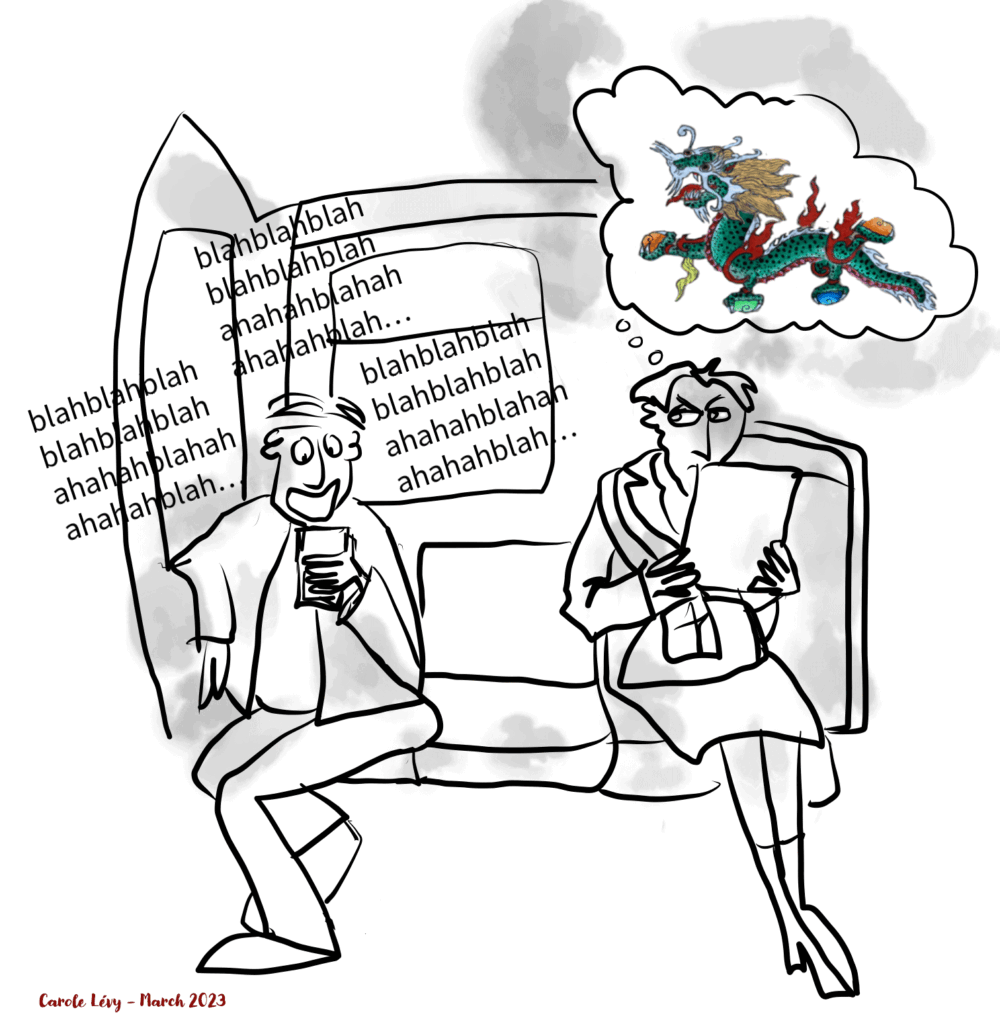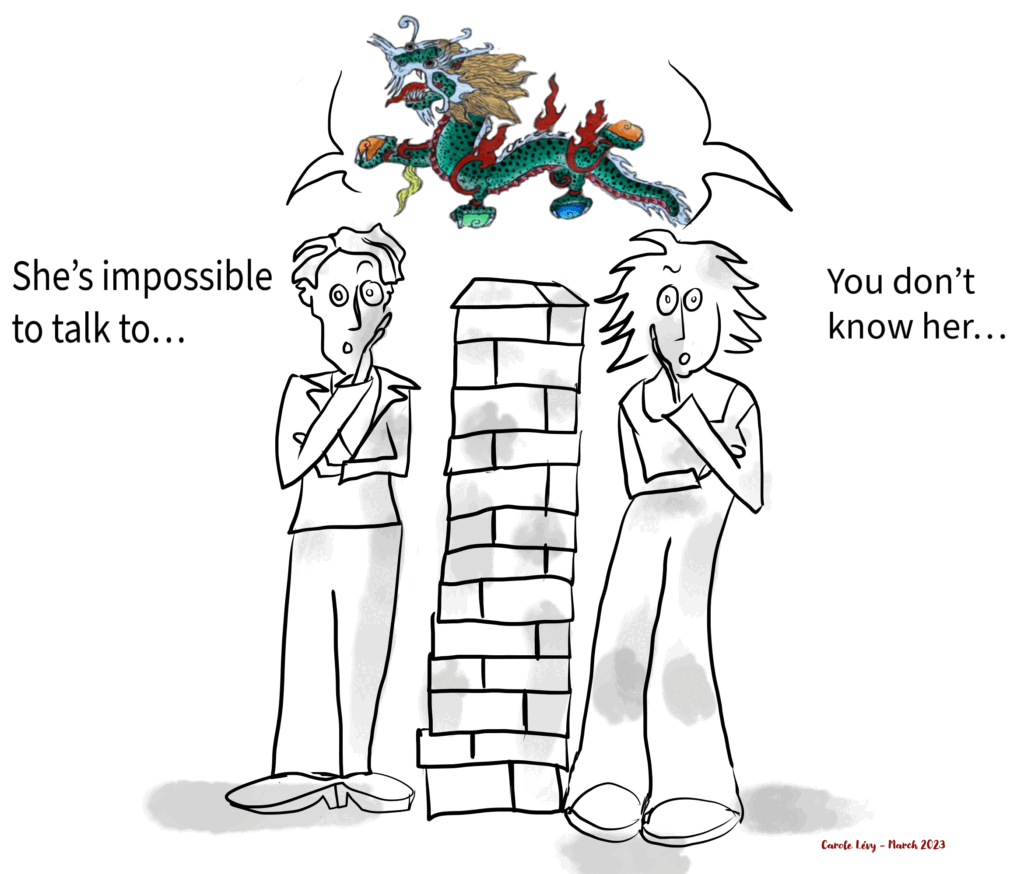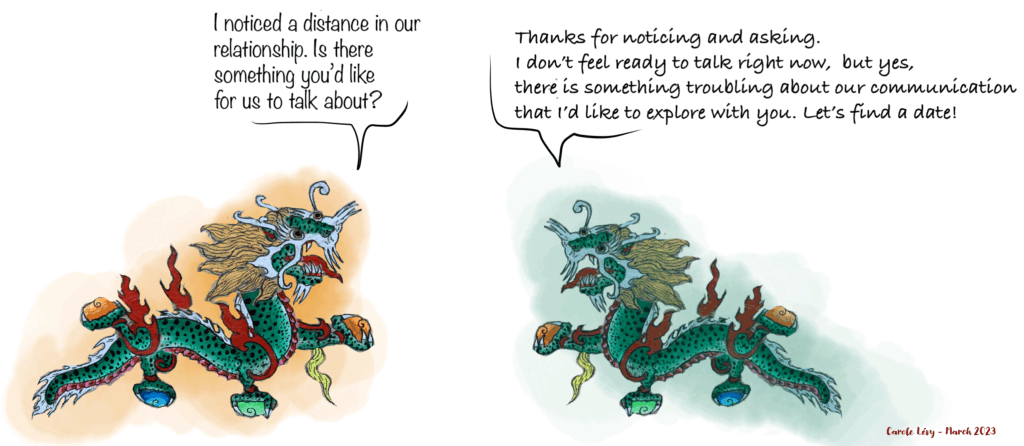One misguided solution to avoid a vulnerable conversation with someone we have an ongoing unproductive dynamic, is to build a solid wall of negative assumptions about this person so that it becomes impossible to engage with them.
We all have been there: it’s more comfortable to amplify someone’s flaws and malevolence while shrinking their positive qualities and benevolence- than face an awkward “Can we talk?” moment, and risk being unheard, misunderstood, seen as petty or made wrong. In other words, rejected.
Demonizing others is an extreme solution to protect ourselves from vulnerability and rejection and unfortunately, it’s a common one.
For example, I recently spent some time traveling in buses, trains, and subways, and noticed my tendency to quickly demonize people who are making noise in public spaces, watching their TikTok or Facetiming with the speaker on high volume. “They are inconsiderate and gross” I would think. Then I would typically tell myself: It won’t last long. And even if it did, I wouldn’t request that they stop, because I wouldn’t want to appear angry, uncool, rigid, or judgmental and, ultimately, be faced with rejection. So, I choose demonization.

As a parent, I’ve sometimes caught myself thinking “my daughter is like this or like that,” to avoid a conversation and risking rejection. Luckily, my intention to have an intimate relationship with my child has always been stronger than my fear of rejection – an effect of unconditional love (the love between a mother and a child or a child and a grandparent, or a person and their pet, for example) So, I’ve had my vulnerable moments and many rejections, but it was worth it. Rejection is perhaps an inevitable condition in the process of building meaningful and intimate relationships.
And by the way, what we take for rejection might simply be a person’s need for space and autonomy: the power to decide when to have – or not have- a conversation. In other words: timing is everything!

A rising need for leadership maturity
With our colleagues and partners, unconditional love is unrealistic because, as adults, we need to develop healthy, practical relationships – a give and take movement of gain and loss, negotiation, reciprocity, and optimally, equality.
We know that unconditional love at work doesn’t make sense, but it doesn’t prevent us from wanting to be accepted, liked and appreciated, which sometimes causes us to avoid any confrontation at all.
Our job as adult-leaders is to navigate the tensions, misunderstandings, divides, loneliness, injustices, betrayals, misperceptions, and all the other challenges that emerge when we work with other people.
As “adult-leader-learners”, we grow in recognizing that our experiences are filtered and distorted by our beliefs and feelings, shaped by our past experiences and identities and so are everyone else’s!
In the 21st century, developing as a leader – gaining in mental complexity, responsibility, maturity, and status – is about creating distance and detachment from our ego-self-centric view of the world to genuinely embrace others’ perspectives, adapt and co-create.
Too often, we look through the narrow lens of demonization rather than risk rejection and negative complications.
Power dynamics and communication
In an organization, power differences are real and inevitable. They need to be named if we want to create a culture where everyone gets heard.
A lot of us have been wounded – shut down- in our ability to communicate our truth and in trusting others, especially others in a higher position of authority/power. The idea of engaging in an honest conversation, when there is a difference of status and identities can be challenging, terrifying, almost inconceivable.
The easy out is to fall into a demonization narrative: “This person is my boss, so I can’t take the chance to give her honest feedback” or “this person is from a marginalized group, therefore, I can’t raise this sensitive topic …”
The person in the position of authority/power has more responsibility to set the norm and tone of communication than the person who has less authority/power. But if the group has established a norm that everyone has a voice, we need to refrain from using our social identities/status as a shield and/or a weapon to avoid confrontation and engagement.
Instead, we need to learn to acknowledge our different identities while discovering each other’s shared humanity and explore our options to make progress in the face of a difficult dynamic – rather than sabotaging it with stigmatization.
Easier said than done. The trick is to slow down our communication, and invest time in conversations.

Practice “checking in”
I’ve been a longtime advocate of organizations normalizing the practice of “checking in.” “How are we doing in our relationships right now?” “Can we clarify what just happened?” “Let’s share our stories to better know each other,” and in some cases, “Let’s begin to repair.”
Unquestionably, these conversations are difficult. I sincerely believe that it helps to have an external person -coach/facilitator or colleague- to hold the communication framework/container.
These conversations take time and emotional energy. But when we start to make progress – to be able to better understand each other – even if there are moments of friction and vulnerability- we also start to realize that demonizing is an energy drain and investing the same time and emotional courage into generating authentic and clarifying conversations is so much more rewarding.
If we want real, sustainable success in organizations where teams of individuals flourish, we must always risk vulnerability, even rejection, over demonization.







